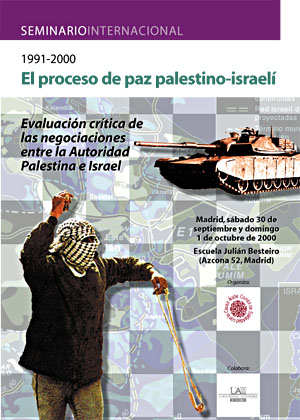
Programme of the International Seminar
1991-2000: THE PALESTINIAN-ISRAELI PEACE PROCESS
A critical evaluation of the negotiations between
the Palestinian Authority and Israel
(Saturday, September 30th and Sunday, October
1st, 2000)
SATURDAY, SEPTEMBER 30th
10:00-10:25. OPENING SESSION: Welcome
from the Arab Cause Solidarity Committee; interventions of Madrid's Autónoma
University Rector, his Excellency Dr. Raúl Villar, and Heads of the
Arab and Islamic Studies and Political Science Departments of Madrid's Autónoma
University (UAM). Reading of support messages from Dr. Haider 'Abdel Shafi
(president of the Palestinian Delegation in Madrid Conference, 1991, and
ex member of the PLC) and Dr. Edward Sa'id, (Columbia University).
10:30-11:30. 1st SESSION: The missing
international legal reference for the resolution of the Palestinian-Israeli
conflict. Introduce by Javier Sádaba, Professor of Ethics (UAM).
a.- United Nations resolutions as the legal framework for the resolution
of the Palestinian-Israeli conflict: the Arab proposal of an International
Peace Conference on the Middle East: Hans Koechler (International Progress
Organisation, professor at Insbruck University, Austria).
b.- From Madrid Conference to OLP-Israel secret negotiations: Oslo
I. Gasan Jatib (ex member of Palestinian team negotiations and Director
of the Jerusalem Media & Communication Centre, Jerusalem, Palestine).
11:30-12:00: Discussion
12:00-12:30: COFFEE BREAK.
12:30-14:00. 2nd SESSION: Development
of the Palestinian-Israeli negotiation process: From Oslo I to Sharm al-Sheij.
Designing the future Palestinian entity. Introduce by Ignacio Alvarez
Osorio, Alicante University and member of the redaction staff of Nación
Árabe.
a.- Territorial shape and land control of the Autonomous Areas and
the Occupied Territories: Palestinian cantons and Israeli settlements.
Jan de Jong (geographer, Holland).
b.- The economic model derived from Oslo: territorial fragmentation,
economic dependence, labour market and Israeli closures policy. NGO's and
Palestinian social crack.: 'Adel Samara, (graduated in Political Economy
and Development, writer and editor of Kana'an, (Ramallah, Palestine).
c.- International supervision of the Peace Process: the role of the
European Union. Graham Usher, writer and journalist based in East Jerusalem,
Palestine).
14:00-14:30: Discussion
14:30-16:30: LUNCH
16:30-18:00. 3rd SESSION, 1st Part: What
future for Palestine? The strategic questions of the Final Status negotiation.
The project of a democratic Palestine. Introduction by Isaías
Barreñada, research and member of the redaction staff of Nación
Árabe.
a.- Refugees: Adnan Shehadeh, representative of Badil, Betlehem, Palestine).
b.- Settlements: Zuhair al-Sabah, Professor at Beirzeit University (Palestina).
c.- Jerusalem: Yael Stein, Research Director of B'Tselem (Israel)
18:00-18:15: BREAK
18:15-19:15. 3rd SESSION, 2nd Part: What
future for Palestine? The strategic questions of the Final Status negotiation.
d.- Sovereignty: 'Adel Samara (Graduated in Political Economy
and Development, writer and editor of Kana'an, Ramallah, Palestine).
e.- Individual and collective rights: Palestinian institutions
and democratization. The evolution of the Palestinian public opinion towards
the Peace Process. Eyad al-Sarraj (psychiatrist, director of Gaza Community
Mental Health Programme, Gaza, Palestine).
19:15-19:45. Discussion
SUNDAY, OCTOBER 1st.
10:30-12:00. 4th SESSION: Palestine in
the Middle East: the New Regional Order and the Arab-Israeli normalisation
in the context of international political, economic and military hegemony
of US. Introduction by Iñaki Álvarez de Terán (UAM,
and member of redaction staff of Nación Árabe).
a.- Public freedom and democracy in the Middle East: Gasan Jatib
(ex member of the Palestinian negotiations team and Director of the Jerusalem
Media & Communication Centre, Jerusalem).
b.- Israel in Middle East: Capitalist globalization and Israeli economic
insertion in the region. A point of view from the Israeli society.
Michael Warshawski (Chairman of the Alternative Information Centre Board
of Directors, Israel).
c.- Restricted sovereignty and new security systems: Graham Usher,
(British writer and journalist based in East Jerusalem, Palestine).
12:00-12:30. Discussion
12:30-13:00. BREAK
13:00-14:00. CLOSURE SESION: A Palestinian
homeland for the Palestinians. Introduction by Luz Gómez García
(Professor of Arab Literature, Unversity of Alicante and member of the redaction
staff of Nación Árabe).
Pedro Martínez Montávez (Professor of Arab Language and Literature,
UAM)
Samih al- Qasim, Palestinian poet, Israel. | 
